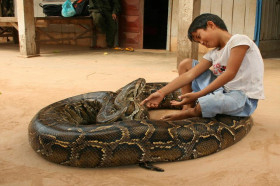Have you ever wondered why some individuals keep exotic pets like otters, raccoons, crocodiles, snakes, and even tigers? The allure of owning unusual pets stems from various reasons, ranging from a fascination with exotic animals to a desire for companionship. While some people intentionally seek out these pets, others become accidental parents when they rescue injured or abandoned animals and decide to care for them. This phenomenon highlights the deep connection between humans and animals, where acts of compassion often lead to lifelong bonds.
For many, the decision to keep unusual pets is driven by a sense of responsibility and a desire to provide a loving home for needy animals. Rescuing an injured animal and nursing it back to health can be a rewarding experience, fostering a strong bond between the animal and its caretaker. In some cases, these animals are released back into the wild after they have recovered, but astonishingly, some return to express gratitude to their rescuers, a testament to the deep emotional connection forged between humans and animals.
However, keeping unusual pets comes with its own set of challenges. Unlike traditional pets like cats and dogs, exotic animals have specific dietary, environmental, and behavioral needs that must be met to ensure their well-being. Adequate space, specialized care, and proper training are essential for exotic pet ownership, and overcoming these challenges requires dedication, knowledge, and resources. Additionally, in many countries, it is illegal to keep wild animals as pets due to concerns about animal welfare, public safety, and conservation efforts.
Despite the challenges, some individuals are willing to go to great lengths to acquire exotic pets, often resorting to black markets and illegal wildlife trade. This underground market not only poses a threat to the well-being of exotic animals but also contributes to habitat destruction and biodiversity loss. The allure of owning a rare or exotic pet can cloud judgment and lead to unethical practices, highlighting the need for stricter regulations and enforcement to protect both animals and ecosystems.
Why Are They Unusual?
- Exotic pets are deemed unusual due to their rarity and unconventional nature compared to traditional domesticated animals like cats and dogs.
- While cats and dogs have been domesticated for thousands of years, exotic pets often come from wild or non-traditional species, leading to their classification as unusual companions.
Legal Implications:
- In many countries, it is illegal to keep certain wild animals as pets due to concerns about public safety, animal welfare, and conservation.
- Monkeys, parrots, turtles, snakes, and other exotic species are often protected under wildlife conservation laws, making it illegal to keep them as pets without proper permits.
- Some individuals may resort to the black market to acquire exotic pets illegally, risking legal consequences and perpetuating the illegal wildlife trade.
Celebrity Examples:
1. Tippi Hedren's Lions: Actor Tippi Hedren owned lions, including Neil, inspired by her time in Africa.
2. Ice-T's Shark: Rapper Ice-T kept pet sharks in a custom aquarium in his home.
3. Tracy Morgan's Octopus: Actor Tracy Morgan sought a new home for his pet octopus, Bwyadette, with a JAWS-inspired aquarium.
4. Mike Tyson's Tiger: Boxing legend Mike Tyson owned a Bengal tiger named Kenya for over 16 years.
5. Justin Bieber's Capuchin Monkey: Pop star Justin Bieber briefly owned a capuchin monkey named OG Mally before facing legal issues.
6. Paris Hilton's Kinkajou: Socialite Paris Hilton kept a kinkajou named Baby Luv as a pet despite being bitten.
7. Leonardo DiCaprio's African Tortoise: Actor Leonardo DiCaprio owns an African spurred tortoise purchased from a trade show.
8. Kirstie Alley's Lemurs: Actress Kirstie Alley owned fourteen lemurs, motivated by her passion for conservation.
9. Nicolas Cage's Albino Cobras: Actor Nicolas Cage kept albino king cobras, Moby and Sheba, among other reptiles.
10. Slash's Snakes: Guns N' Roses guitarist Slash has owned numerous snakes and exotic animals, reflecting his love for wildlife.
In conclusion, the allure of owning unusual pets is multifaceted, driven by a combination of fascination, compassion, and a desire for companionship. While some people choose to keep exotic pets as a symbol of status or as a unique hobby, others do so out of genuine love and care for animals in need. However, it's crucial to approach exotic pet ownership responsibly, considering the welfare of the animals and the implications for conservation and biodiversity. By fostering a deeper understanding and respect for exotic animals, we can ensure their well-being and contribute to a more harmonious relationship between humans and wildlife.
